August 31, 2025 | 07:50 GMT +7
August 31, 2025 | 07:50 GMT +7
Hotline: 0913.378.918
August 31, 2025 | 07:50 GMT +7
Hotline: 0913.378.918
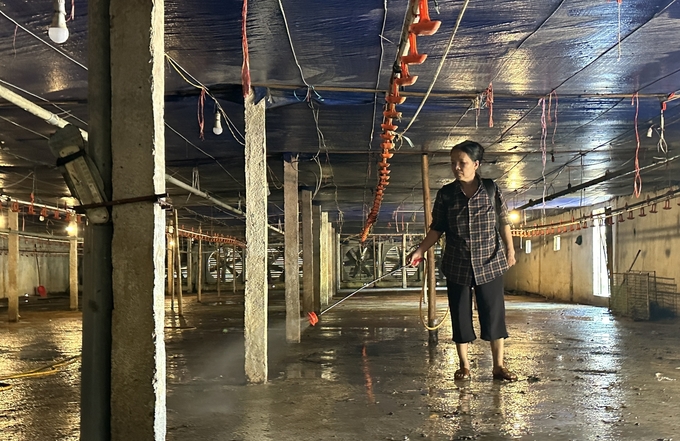
Ha Thi Thang sprays a solution utilizing the microbial fermentation method to treat the barn environment. Photo: Quang Linh.
Ha Thi Thang’s farm in Dong Chay hamlet, Phu Ly commune, Phu Luong district (Thai Nguyen) lost nearly 10,000 chickens due to flooding. After the flood receded, her family coordinated with local veterinary agencies to clean up the dead animals and sprinkle lime powder. However, the barn area still had a foul odor, posing a potential risk of a dangerous disease outbreak.
Considering the context, the Center for Community-Involved Organic Agriculture - Vietnam Organic Agriculture Association (a representative of the Green Project Vietnam) coordinated with the sponsor Sasaki - Orgen to implement the program "Supporting disadvantaged areas affected by Typhoon No. 3 to restore production" in Phu Ly commune, Phu Luong district.
The program supports farmers with Emuniv microbial products, supplies breeds and agricultural materials, and provides training in livestock environmental treatment techniques.
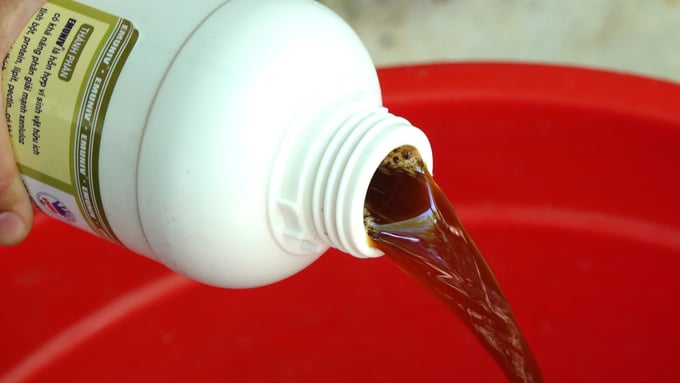
Using biological products to treat the environment is safe for humans. Photo: Quang Linh.
Bui Thi Hong Ha, Director of the Center for Community-Involved Organic Agriculture (Vietnam Organic Agriculture Association) directly went to Thang's farm to guide the family in preparing for Emuniv to treat the livestock environment.
The experts have given some instructions: Farmers mix 0.5 kg of molasses or sugarcane juice into 20 liters of water, inoculate 1 packet of Emuniv powder or 1 liter of Emuniv liquid, fill a clean can, screw the lid tightly, and incubate for 3 to 4 days. When opening the lid, if they smell a pleasant sweet and sour aroma and achieve pH <4, the solution is considered meeting the requirements.
Dilute the fermented solution 10 times to spray on walls, wash the barn floor, and mix into drinking water for livestock and poultry. Use a spray bottle to evenly spray 1 liter of diluted solution over an area of 50 square meters. Spray and treat barns daily. Use a more concentrated solution in places that require high deodorizing efficiency. If spraying is not done regularly, dilute the concentrated solution and spray at least once every 7 days.
Farmers can also dilute secondary solutions and sprinkle them on the floor every day after cleaning the barn. The amount used depends on the level of pollution on the barn floor and in the wastewater treatment tank. On average, 1 liter of secondary solution (after incubation) treats 2 cubic meters of wastewater.
After that, farmers can spread a 5 - 7cm layer of rice husks on the chicken coop floor. Spray the fermentation solution (be careful not to spray too wet), rake, mix well and raise the chickens for the rest of the crop. They can avoid bad odors and prevent white diarrhea in chickens.
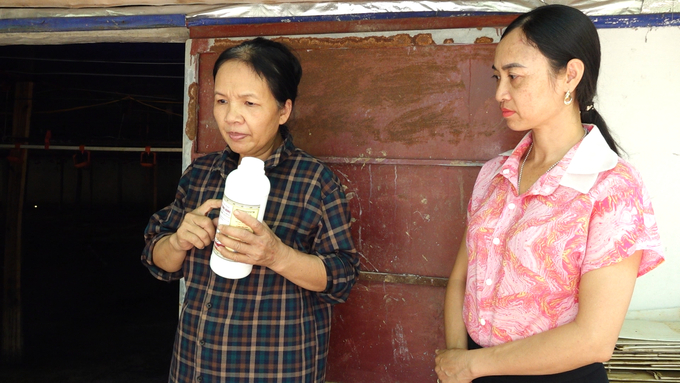
People listen to expert’s instructions on using microbial products to treat the farm environment. Photo: Quang Linh.
According to Bui Thi Hong Ha, Emuniv contains a collection of carefully selected microorganisms with many advantages. The product has the ability to produce enzymes that quickly decompose unwanted organic substances such as waste, post-harvest waste, and animal manure.
These enzymes grow well in nutrient-poor environments and can compete with unfavorable microorganisms, such as putrefactive microorganisms, thus significantly reducing the stench from waste piles. The product also has the ability to produce antibacterial substances, inhibiting some pathogenic microorganisms.
This microbial product is safe for humans, animals and the ecological environment. The microorganisms in the product are of level 1 safety. The product does not contain toxic substances as per the regulations of the Ministry of Agriculture and Rural Development.
Regarding the effect of treating barn odors, the solution quickly decomposes organic compounds, inhibits the activity of anaerobic microorganisms that cause odors, increases the density of aerobic microorganisms in the barn area, controls pathogens, and limits flies and mosquitoes.
In addition to the effect of environmental sanitation, when it comes to livestock farming, Emuniv microbial preparation is also used as biological bedding or manure and wastewater treatment solutions. It assists in the process of composting food and drinking water for livestock.
Emuniv is a microbial product used to treat trash and barn waste, the first microbial preparation for environmental treatment in Vietnam. This is a product of a state-level project invented by the University of Science - Vietnam National University (Hanoi) and registered with the Ministry of Science and Technology since 1990 with code 52D-04-01.
Translated by Samuel Pham
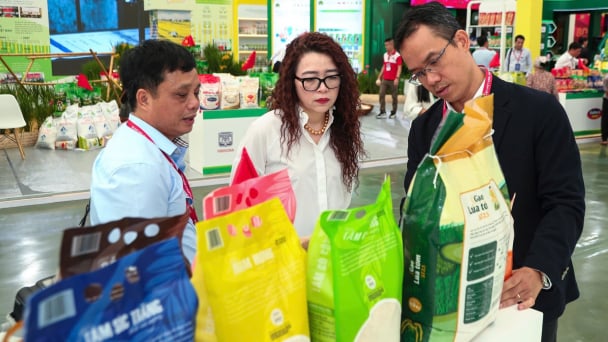
(VAN) Over the past 80 years, the food sector has walked alongside the nation, from shared jars of rice during the resistance to ships carrying Vietnamese rice brands across the five continents.

(VAN) Vietnam’s geology sector has marked its presence through achievements in mineral surveying and exploration, affirming the country’s resource potential and contributing to sustainable development.

(VAN) The Viet Nam Institute of Meteorology, Hydrology and Climate Change Director shares insights on 80 years of the sector’s achievements, its role in disaster forecasting, and messages for the younger generation.

(VAN) VAN News cordially introduces the message from Mariam J. Sherman - World Bank Division Director for Viet Nam, Cambodia and Laos - about the Viet Nam's 80-year journey of development.

(VAN) That is the theme of the 2025 International Workshop “2nd International Conference on Biological Protection in Sustainable Agriculture (ICBPSA),” held in Hue City.
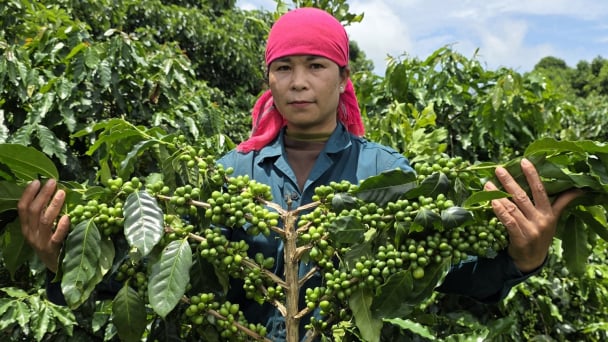
(VAN) Cultivating coffee without causing deforestation is a growing trend in the southwestern communes of Quang Tri province, supported by many businesses.

(VAN) Vietnam's wood industry has established its global presence by making substantial contributions to GDP, rising from modest export revenues of only a few hundred million to a record-breaking 16.25 billion USD in 2024.